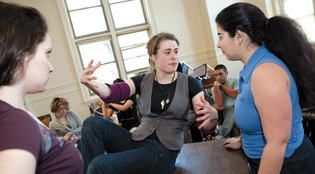 loading
loading
Arts & CultureTill the svelte lady sings Julie BrownLuisa Proske, a directing student at the School of Drama, explains her concept for a staging of Handel's Acis and Galatea to music students Mireille Asselin ’10MusM (left) and Gala El Hadidi ’10MusM. View full image
In our grandparents’ day, or maybe our great-grandparents’, when a box at the Met was handed down like the family silver, the mantra used to be that opera was all about voice, voice, voice. Alas, for much of the twentieth century, the glorification of the voice brought with it neglect of theatrical values. Opera came to mean ramshackle sets, tatty costumes, and corpulent dowagers cast as nubile courtesans. Bored with the lingering traditions of yesteryear, companies today are promoting opera as total theater—in truth, a concept as old as the genre itself—and seeking directors from theater and film who can do justice to the drama without shortchanging the music. At the Yale School of Drama, a new opera practicum for singers and directors, created with the School of Music, addresses the challenges and opportunities awaiting students upon graduation. The course was co-taught this spring by directing professors David Chambers and Liz Diamond, who believe it to be the first of its kind in the nation. For many of the nine directing students, opera was an undiscovered country at the start of the semester. For the half-dozen opera students, the intense collaboration with theater directors was likewise a new adventure. Chambers and Diamond had recruited a starry lineup of master teachers—officially “visiting lecturers”—all of them respected directors from the brave new world of contemporary opera. The course was designed to familiarize the class with challenges specific to opera: following the pace of the action as set down by the composer, giving dramatic clarity to repetitious or overlapping text, and coping with the sheer scale of opera houses, which are typically much larger than playhouses. The final workshops were devoted to Handel’s pastorale Acis and Galatea. The assignment for Charlotte Brathwaite ’11MFA was to stage Polyphemus’s aria “O ruddier than the cherry,” an expression of his arousal and frustration. Brathwaite imagined the character as a graduate student locked away in his dorm room, surfing X-rated websites for release. The talented Jeremy Bowes ’10MusM fell in with her concept, singing and improvising with fierce concentration. As he sang, Brathwaite had chorus members stationed around the room mime the same pent-up private rage and pain. The visiting director, Sam Helfrich, found the idea powerful. But he raised questions about the execution. Brathwaite said she had hoped to work out a great many practicalities in rehearsal. That trial-and-error approach has its advantages—for one thing, it capitalizes on the ideas of the performers—and in theater, it is common. But most opera singers’ inexperience with improvisation makes it a recipe for disaster, as Helfrich kept emphasizing. “There’s really no time to run a scene to see how it works,” he said. True to the spirit of a practicum, Helfrich’s concern was craft, not concept. Whether traditional or far-out, a director needs to know how to guide the viewer’s eye to the action that matters. As an example of how wrong things can go, he cited a production of Carmen, the evergreen tragedy of opera’s quintessential femme fatale, at a major American company that shall remain nameless. The curtain rises on a band of smugglers skulking by night through a craggy mountain pass. The audience knows that Carmen is among them. But lights are low, the costumes generic, individuals impossible to make out. Then, suddenly, Carmen’s voice is heard. “At every performance,” Helfrich said, “the same thing happens. People everywhere start looking high and low and muttering, ‘Where’s Carmen?’” Knowing laughter all around the room. Where’s Carmen? Funny you should have to ask.
The comment period has expired.
|
|